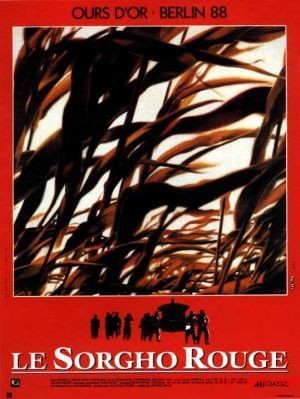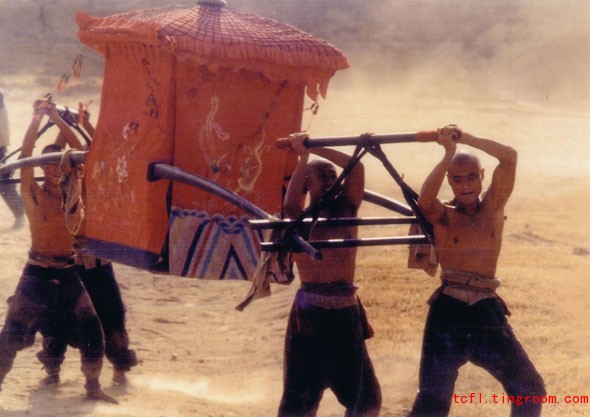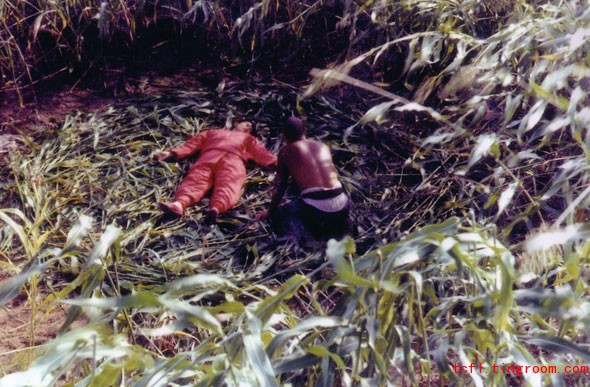Directed by Yimou Zhang
Produced by Wu Tianming
Written by Mo Yan
Starring Gong Li
Jiang Wen
Music by Zhao Xiaoping
Cinematography Gu Changwei
Studio Xi'an Film Studio
Release date(s) China:1987
United States:October 10, 1988
Running time 95 minutes
Country China
Language Mandarin

Red Sorghum is a 1987 Chinese film about a young woman's life working on a distillery for sorghum liquor. It is based on a novel by Nobel laureate Mo Yan.
The film marked the directorial debut of internationally acclaimed filmmaker Zhang Yimou, and the acting debut of film star Gong Li. With its lush and lusty portrayal of peasant life, it immediately vaulted Zhang to the forefront of the Fifth Generation directors.
Plot
The film takes place in a rural village in China's eastern province of Shandong during the Second Sino-Japanese War. It is narrated from the point of view of the protagonist’s grandson, who reminisces about his grandmother, Jiu'er. She was a poor girl who was sent by her parents into a pre-arranged marriage with an older man. This man, Li Datou, who owned a distillery, suffered from leprosy.
As her wedding party crosses a field of sorghum, they are attacked by a bandit with a pistol. The hired sedan carrier fights off the assailant and a series of subtly flirtatious looks are exchanged. After she reaches the winery, the man disappears. He returns to the screen while Jiu'er is returning from her parents' house. We see him wearing the same mask as the man who attacked them three days before. He kidnaps Jiu'er and after a short chase, reveals his identity. He then clears some sorghum and they engage in sexual intercourse.


After the leper was mysteriously murdered, the young widow takes over the distillery, which has fallen on hard times. She inspires the workers to take new pride in their wine, and once again meets the man who saved her life and then deflowered her. He arrives drunk and tries to claim her, telling the distillery workers how he deflowered her and that he is going to sleep in her room, but she tosses him out and he makes a fool of himself in his drunken rudeness. He sleeps in a liquor vat for three days, while the bandits kidnapped Jiu'er and asked for ransom, which the distillery workers paid. The bandits did not rape her because she told them she had slept with her deceased husband, the leper.
Later, the man who had intercourse with her comes back again, when they make the first batch of liquor. He takes four vats of the liquor and urinates in them, shocking the employees. He meant it to anger Jiu'er, but somehow his urine makes the liquor taste better than ever before. The longtime distiller, Luohan, leaves in disgust, presumably because of her affair with the hired bearer and the resultant bastard son, the narrator's father.
The style of the film shifts from fable to realism when the War begins and the Imperial Japanese Army troops invade the area. The Japanese soldiers order forced laborers to flatten the sorghum fields. The widow Jiu'er and the winery workers are among the forced laborers. The Japanese then order a butcher to skin the bandit alive. The butcher resists, but is given a choice of death or skinning, as a reminder to the laborers not to resist. The butcher is near to doing it, but in hopeless desperation he choose to kill Shanpao to avoid skinning him. He is machine gunned by the Japanese soldiers, and the butcher's assistant is given the task, to skin Luohan, the distillery worker, lest he himself be skinned. He does the skinning, and loses his mind. The narrator then identifies many atrocities of the Japanese during the war and notes Luohan as a member of the Communist guerrilla resistance.
They then have a liquor tasting ritual wher they celebrate Luohan and his liquor, wher Jiu'er recommends the distillery workers avenge his death. All of the distillery workers toast with the liquor, as does Jiu'er's son, the narrator's father, with the same song that Luohan sung at other rituals. In the early dawn, they set an ambush and take liquor with them to use as a fire bomb, which is urinated in by Jiu'er's son. Later, the boy runs back to the distillery and tells his mother the men are hungry. She arrives in time to be machine-gunned by the Japanese. The ambush is a noble disaster, with cannons misfiring and killing some of the ambushers but their homemade liquor grenades destroy the Japanese trucks and troops, as well as most of the distillers. In the end, there is nothing but scenes of death, with the narrator's grandfather and father observing a red eclipse symbolic of the death and destruction and the red color of the liquor. The narrator's father is left chanting a prayer for his mother to rise to heaven at the close of the film.
 English
English Japanese
Japanese Korean
Korean French
French German
German Spanish
Spanish Italian
Italian Arab
Arab Portuguese
Portuguese Vietnamese
Vietnamese Russian
Russian Finnish
Finnish Thai
Thai dk
dk